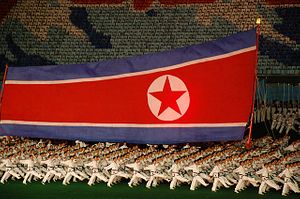Realists in international relations believe that small players have little room to maneuver in a world dominated by big powers, yet the North Korean tail has been wagging the big power dog for decades. The recent North Korea crisis offers several lessons about great power relations and East Asian security.
First of all, with the deterioration of security environment in Northeast Asia, no one emerges as the winner from the crisis, but China and the United States are the biggest losers.
In the eyes of many observers, Beijing has failed to play its expected role as a responsible power, putting its own interest above the global interest of nuclear nonproliferation. It is understood that if China tightens the screw on North Korea, the Pyongyang regime will quickly collapse, triggering a massive refugee stampede into China and leading to Korean reunification under U.S. influence. This is why China has balked at crippling the North Korean economy.
But Beijing will pay a price for its continued shielding of North Korea. If the THAAD anti-missile system is deployed in South Korea, the PRC-ROK honeymoon will be over. Japanese Prime Minster Shinzo Abe conveniently seized the opportunity to promote constitutional change and a more assertive defense policy, with China probably as the real target. In a short span of time, China has found itself facing moral, diplomatic and strategic challenges.
North Korea’s nuclear advances also mark a failure of U.S. foreign policy. The Obama administration has outsourced de-nuclearizing North Korea to China. Believing China holds the key to the North Korea problem, Washington shifted all responsibility to China while waiting for North Korea to collapse or repent. As the global leader, the U.S. should have paid more attention to such a critical security issue; it is irresponsible to expect China to solve the problem without considering its concerns. Hawks in Washington may be secretly celebrating since the crisis provides additional justification for the controversial “pivot” to Asia policy. But whatever the United States gains there is offset by the growing suspicion and tension between the United States and China.
Second, there should be no doubt that China and North Korea are not allies. Western observers and journalists routinely portray China as North Korea’s “only ally.” The fact is North Korea is not China’s client state and it does not care what China thinks. Chinese disdain for North Korea is growing. Many consider North Korea China’s burden and an annoying neighbor instead of an old friend. Veteran diplomat Wu Dawei’s last minute efforts to persuade North Korea to halt the satellite launch failed. North Koreans hate being lectured to by the Chinese. Pyongyang defied the international community, but particularly China, and launched the satellite on Chinese New Year’s Eve. The rift between China and North Korea will only grow larger.
In a recent interview with the New York Times, Yan Xuetong of Tsinghua University suggests that China and North Korea are not allies. Yan notes that since at least 2013 China has treated China-North Korea relations as normal state-to-state relations. Yan is not the first to make that claim. In fact, no Chinese officials or diplomats in recent memory have called North Korea an ally. To acknowledge the fact that China and North Korea do not even like each other helps us understand why China’s leverage over North Korea is limited.
Third, this is not so much a North Korea problem as it is a U.S.-China problem. Though the United States and China share the objective of a nuclear-free Korean peninsula, their approaches to achieving it are vastly different, and their visions for East Asia’s future do not converge. From North Korea to Taiwan, from the East China Sea to South China Sea, the two powers have been unable or unwilling to compromise their positions. At the core of the latest crisis is a lack of strategic trust between the United States and China. The two powers have lost another opportunity to strike a grand deal to build trust and promote peace in East Asia.
Finally, Kim Jong-un’s ability has been underestimated. Few expected the inexperienced young dictator to stay in power for long. Yet more than four years after he succeeded his father, Kim appears to have consolidated his position. Fully aware of the U.S.-China division, the capricious Kim is very calculating and has pushed forward North Korea’s nuclear program. While U.S. President Barack Obama is exercising “strategic patience” and Chinese President Xi Jinping is emphasizing “stability” in Northeast Asia, Kim has advanced North Korea’s nuclear technology and boosted his stature at home. A more benign view is that with the successful nuclear test and satellite launch, Kim may now be able to turn his attention to the economy. The implementation of his byungjin policy (parallel development of the economy and nuclear program) may soon be in full swing. But there is no way we can tell what is on Kim’s mind. The only thing that is predictable about North Korea is its unpredictability.
The North Korea crisis reveals deep-rooted problems in the region. As the international community plans to impose new sanctions of questionable efficacy, all players involved must take the moment to somberly rethink these fundamental problems and redouble their efforts to bolster regional security.
Zhiqun Zhu is a professor of political science and international relations at Bucknell University in Pennsylvania.

































